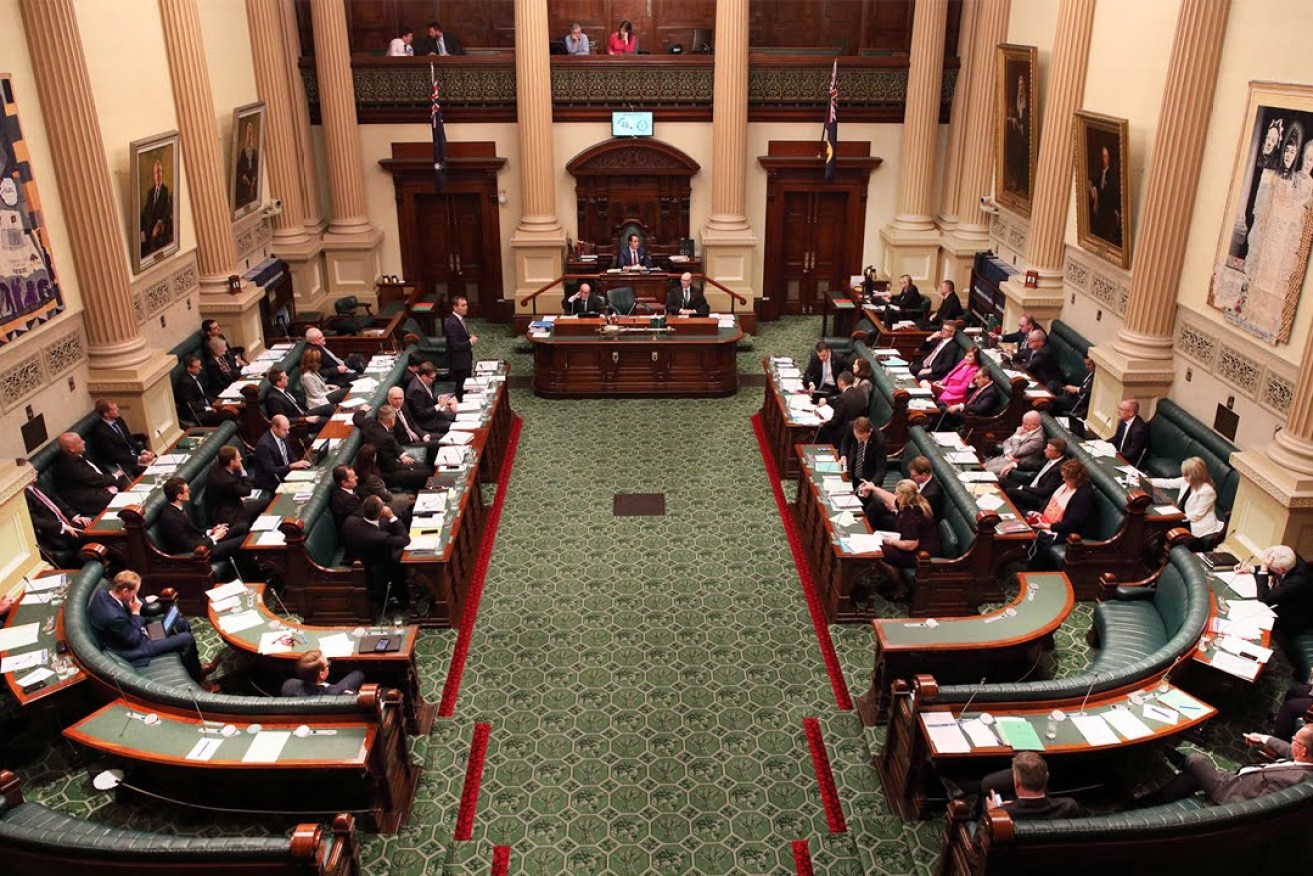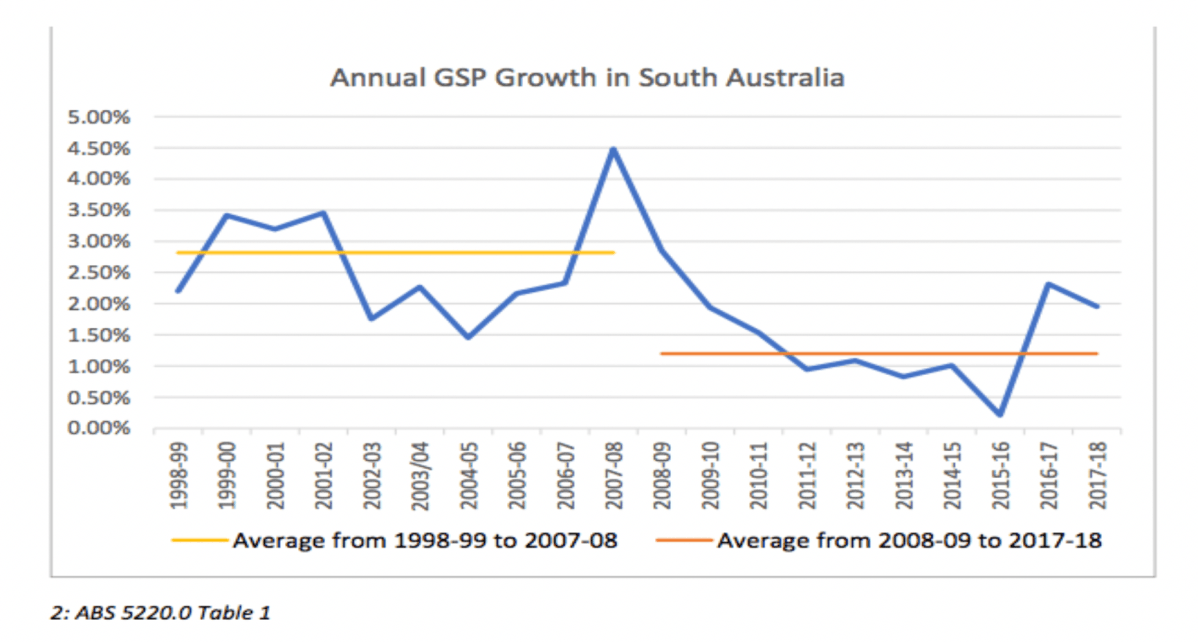No, SA’s core economic problems haven’t been fixed
It’s dangerous to pretend otherwise – economic contraction and underemployment remain huge problems for South Australia, argues Malcolm King.

"The State Government is bereft of ideas, preferring, like the ALP before it, to allocate funds and manage road-building projects." Photo: Tony Lewis/InDaily
Incremental economic decline is like a frog sitting in cold water: if we turn the heat up slowly, it doesn’t notice until it’s boiling alive.
Five years ago, I wrote an InDaily opinion piece called Adelaide’s decline and fall. I’d returned to Adelaide in 2008 after working in Melbourne and Canberra for 20 years. The city looked like a ghost town. I reckon it’s worse now.
This story expands on that article and examines how social, economic and organisational pathologies, are crippling the “Athens of the South”.
Contrary to public opinion, Adelaide’s problems are structural and ever-present. There is no comparison with other mainland capital cities.
Thousands of people have been thrown out of secure full-time work and into precarious employment or underemployment. The workforce is being carved to pieces due to unrelenting economic contraction.

Gross State Product (GSP) is the total value of goods and services produced in a financial year. The above graph plots the state’s economic decline. The 2007-08 blip upwards is the Federal Government pump-priming the national economy during the Global Financial Crisis.
Much has been written about the decline of manufacturing. While this plays a key part in urban decay, Adelaide is also mind-manacled by dire sociological problems.
Adelaide’s population is barely growing at 8000 people per year, according to the ABS. The good news is that only 5200 people left the state in 2018-17, compared to more than 7000 the year before.
The bad news is that these figures rely on departing individuals notifying Medicare of a change of address. The true number of emigrates is closer to 9000 per year. Less than seven per cent return.
Last year, South Australia lost a House of Representatives seat due to population distribution. This is very dangerous because the state gets almost 50 per cent of its monies from Federal Government coffers.
Diminished representation holds the threat of diminished revenue. We saw that recently with cuts of more than $500 million to the state’s GST revenue, revealed in the federal budget. Without federal revenue, Adelaide would look more like Harare than a docile, large country town.
Many of the young men and women who left the state in the past 40 years took with them their idealism, their fire and leadership potential.
The flight of human capital is the driver behind a decline in organisational standards. A lack of new thinking in any organisation leads to psychological regression and behaviours such as bullying, white-anting, nepotism, groupthink and passive aggression.
Past and present problems in Families SA, Health SA and TAFE SA are in large part due to brain drain. Many private businesses of scale suffer the same fate.
To compound this blight, private recruiters are eliminating candidates of merit, because they’re perceived to be “too old” or else they have international or interstate qualifications and experience, and therefore pose a threat to their immediate senior reports.
If they do land a job, they’re confronted with the fallout of 40 years of inaction and comments such as, “but this is the way we’ve always done it”. They stay less than a year or two before hightailing it to organisations operating in the 21st century.
The State Government is begging migrants to settle in SA. When they do arrive, they too run the gauntlet of the recruiters, but realise too late that unemployment and underemployment are endemic in many industries. As they can’t access Newstart for two years, they live frugally off their savings or work in lowly paid or underpaid jobs.
When young people leave, there are serious knock-on effects. For example, some courses in our three publicly-funded universities have lowered their ATAR scores because there aren’t enough candidates of merit. I believe there is sufficient demand for two universities, not three, yet they continue to enrol students in courses without recognising that the connected local job market has nosedived. Students are treated as walking dollar signs.
At the same time, young people are portrayed by mainstream media as being lazy, thin-skinned and spoilt. The notion that young people have problems – such as racking up a $40,000 HECS debt and only a casual job to pay it off – has mutated into the belief that young people are the problem.
Many of the young men and women who left the state in the past 40 years took with them their idealism, their fire and leadership potential. That’s why it so heartening to read the accomplishments of SA’s businessmen and women in InDaily’s 40 Under 40.
Much of the machinery of government is a Kafkaesque game that mimics busyness while doing next to nothing.
On the other side of the coin, there are about 634,000 people over 50 years of age, out of a population of 1,676,653, according to the 2016 Census.
Cities run on young blood, energy and innovation, yet the number of people aged 15-34 is fewer now than it was in the 1980s.
What will Greater Adelaide be like in 20 years?
Conservative and orthodox attitudes will rule and much public policy will focus on the grey vote.
Apart from media-driven propaganda about job creation – including the facile focus on economic reports which bear no resemblance to lived experience – much public discourse about “saving the state” revolves around the two major political parties.
They are praised or castigated depending on one’s allegiance. Yet the state ALP and Liberal Party are both neoliberal “lite”.
They are as interchangeable as they are ineffectual. Their dominant political ideal is not social democracy, it’s managerialism.
The western democratic tradition had a dialectic at its core: a battle of ideas between the state and private industry, between employer and labour and between a centralist or federalist system.
In SA – and to a large degree across the nation – this tension has been replaced by bargaining positions.
The State Government is bereft of ideas, preferring, like the ALP before it, to allocate funds and manage road-building projects. Much of the machinery of government is a Kafkaesque game that mimics busyness while doing next to nothing. The level of denial is extraordinary.
These systemic cancers have riddled South Australia for more than a generation.
To paraphrase Kafka, we must take an axe to the frozen sea of sloth and spin that infects the state. If we don’t, urban blight awaits.
Malcolm King is a professional writer who splits his time between Canberra and Adelaide.
Want to comment?
Send us an email, making it clear which story you’re commenting on and including your full name (required for publication) and phone number (only for verification purposes). Please put “Reader views” in the subject.
We’ll publish the best comments in a regular “Reader Views” post. Your comments can be brief, or we can accept up to 350 words, or thereabouts.
InDaily has changed the way we receive comments. Go here for an explanation.




